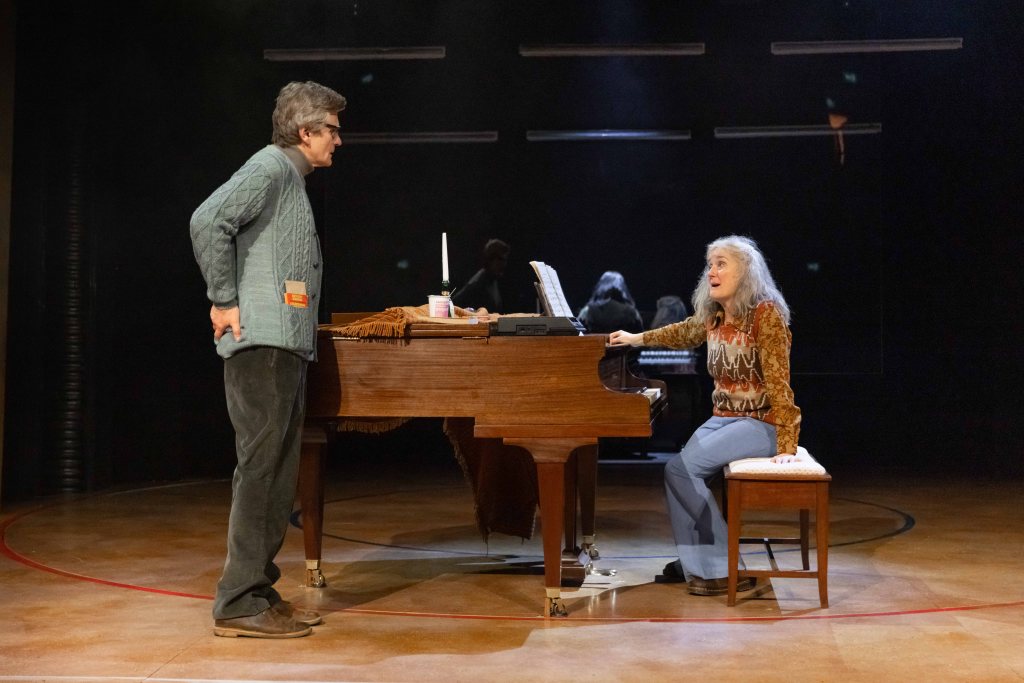Charles Edwards and Sophie Thompson star in the world premiere of Samuel Adamson’s latest play, exploring the trials and tribulations of two opposite people sharing the strongest and longest bond of their entire lives. Guillermo Nazara shares his views on the show, to let us know if its music-themed narrative dealing with love-hate relationships hits the right note.
Have you had that kind of friend you could slap every time they talk but you still love them and would do anything for them?Well, no worries – I can help you with that. I’ll do the slapping part while you can just adore me… Come to think of it, that may be another kind of relationship. Whatever! I don’t have too much dominance over labels. Moving on. Let’s travel back and forth in time through a nexus built over the course of decades, despite much of it being defined by absence and distance. Yet, like that unwritten melody that underscores our journey in life, it carries on and on as an unfinished work where there’s no period, but just a constant ellipsis.
Last night marked the opening of The Ballad of Hattie and James, a new drama penned by renowned playwright Samuel Adamson, and starring two well-acquainted faces around both screen and stage. Directed by Richard Twyman, the piece is a poetic picture on the complexity of our feelings not only for others but also for ourselves, and the emotions that toil within us through the choices that we make. Two kindred spirits with surprisingly very little in common, the text explores the separated paths of its two protagonists – first connected through their passion for music, but grown apart through the meaning that they find it, and in their own existence.

An excellent premise that exudes depth, intricacy and introspection, the script excels at delivering a rather compelling narrative which, despite lacking a bit more action and sentiment, still manages to bond with its audience – particularly, due to Adamson’s exceptionally clever and cunning dialogue. Packed with satire, cultural richness and a bit of philosophical profundity, the text carries out a mildly engaging storyline where the characters’ observations about life values become its most precious asset, but doesn’t quite touch the soul as much as it attempts to by sometimes pulling too hard from the heart’s strings.
There’s death and loss, there’s estrangement and grievance. Yet, some of those themes seem to be used rather than covered – sometimes times, relying on them as a quick trick to move the viewer rather than let the plot’s natural flow do it. As a result, we get to like both roles through their amusing quirks and quarks (some of them, extreme, but always memorable, sympathetic and, above all, believable). Yet, we don’t get to care about them as much as one would wish – giving us the chance to enjoy their personalities, but never to fully feel linked to their plights.

In any case, the production still holds some praiseworthy elements, starting with Jon Bausor’s fluid and symbolic design, founded primarily on the use of a revolving stage combined with some props and, as a third role, live music performed on the two pianos completing the scenery. On the other hand, the whole cast gives an extraordinary rendition in their multiple roles, those including the leads. The directional choice of elder people playing their younger selves works remarkably well, endowing the personages with more probity and poignancy, as well as proving Charles Edwards and Sophie Thompson’s subtle versatility, apart from their bouncing flair and rapport. In addition, Suzette Llewellyn also deserves a mention due to her ongoing transformations from role to role, jumping from a charming teacher to an obnoxiously toxic wife at a spotlight snap.
A lyrical depiction of time and memory, The Ballad of Hattie and James brings harmony to its storyline through the dexterity of its words, but fails to resolve it by not making enough progressions and reflecting too much on a safe lilt. It has the power to become something transcendent, but still has to find a stronger pulse – not necessarily more original (at the end of the day, it’s a tale that, though we’ve heard it in many keys and styles already, it continues to resonate) but at least reach a more seductive modulation. It follows the right scheme, yet it’s a few bars away from getting tonic.
All pictures credit to Mark Senior.
The Ballad of Hattie and James plays at London’s Kiln Theatre until 18 May. Tickets are available on the following link.

